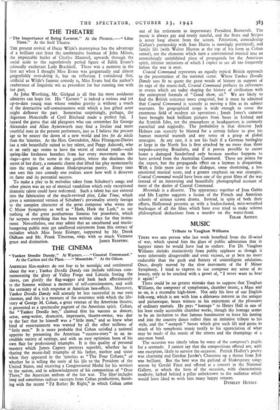THE THEATRE
THE present revival of Oscar Wilde's masterpiece has the advantage of a brilliant cast from the unobtrusive footman of John Milton,
the impeccable butler of Charles Maunsel, upwards through the social scale. to the superlatively period figure of Edith Evans's colossally exuberant Lady Bracknell. There was a moment in the first act when I thought Miss Evans was gargantually and almost gargoylishly over-doing it, but on reflection I considered that, artificial as Wilde's famous comedy is, Miss Evans had the author's exuberance of linguistic wit as precedent for her running riot with her part.
As John Worthing, Mr. Gielgud is all that his most assiduous admirers can hope for. His " Earnest " is indeed a serious and yet up-to-date young man whose sombre gravity is without a touch of the destructive self-consciousness with which a less gifted actor might deflower the part. Somewhat surprisingly, perhaps, the Algernon Moncrieffe of Cyril Ritchard made a perfect foil. I hazard the guess that old playgoers who can remember Sir George Alexander and Allan Aynesworth may find a livelier and more youthful note in the present performers, just as I believe the present age to be nearer the dawn of a new world and less fin de siecle than the 'nineties. As the Hon. Gwendolen, Miss Ffrangcon-Davies has a role beautifully suited to her talent, and Peggy Ashcroft, who at an early age seems to have the secret of eternal youth—such spring-like freshness breathes from her every movement on the stage—gave to the scene in the garden, where she discloses the secret of her diary, a romantic charm that lifted the play momentarily into the region of an almost Shakespearean poetry. Every time one sees this rare comedy one realises anew how well it deserves its fame and its perennial success.
To make a play to fit melodies taken from Schubert's songs and other pieces was an act of musical vandalism which only exceptional dramatic talent could have redeemed. Such a talent has not entered into the fabrication of the much-revived play, Lilac Time, which gives a sentimental version of Schubert's personality utterly foreign to the complex character of the great composer who wrote the C Major Symphony as well as "Hark, Hark the Lark," to say nothing of the great posthumous Sonatas for pianoforte, which far surpass everything that has been written since for that instru- ment. Nevertheless, one may admit that an uncultured and music- hungering public may get unalloyed enjoyment from this extract of melodies which Miss Irene Eisinger, supported by Mr. Derek Oldham and Mr. Frank Titterton, sings with so much Viennese


























 Previous page
Previous page